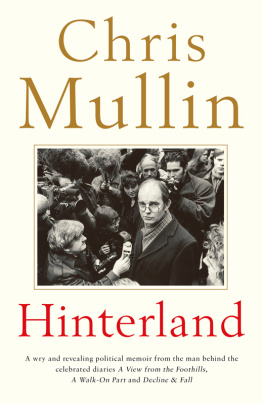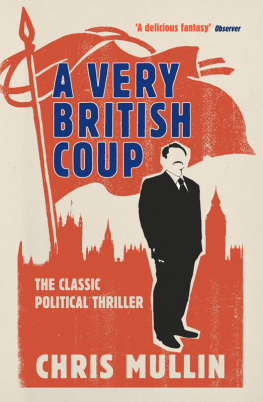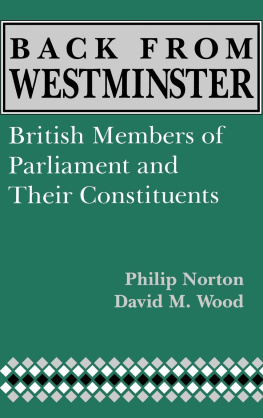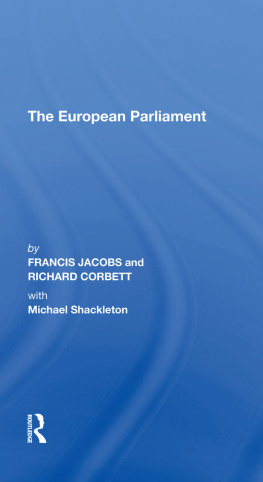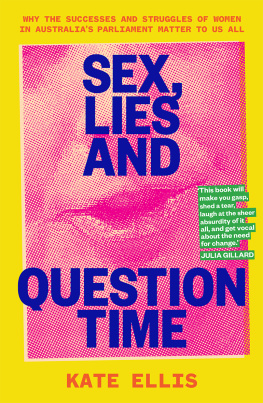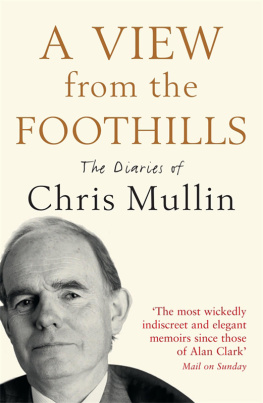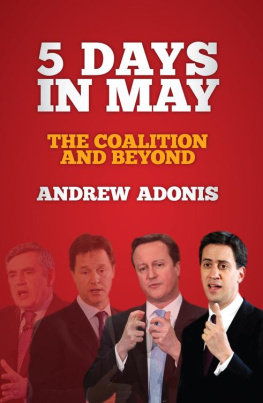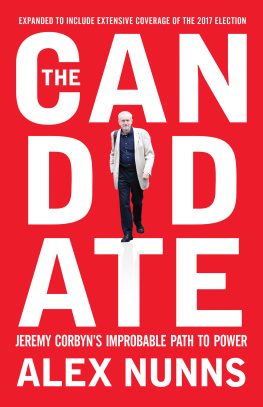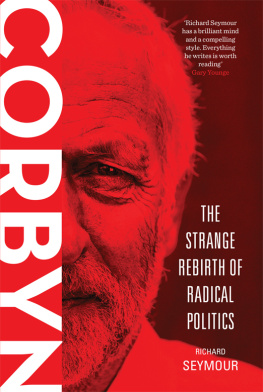HINTERLAND
CHRIS MULLIN was the Labour MP for Sunderland South from 1987 until 2010. He played a key role in Tony Blairs New Labour government, chairing the Home Affairs Select Committee and served in three departments. He is the author of three volumes of diaries, A View from the Foothills, A Walk-On Part and Decline and Fall, and the bestselling novel A Very British Coup, re-published by Serpents Tail, which was turned into an award-winning television series.
ALSO BY CHRIS MULLIN
Diaries
A View from the Foothills
Decline & Fall
A Walk-On Part
Novels
A Very British Coup
The Last Man Out of Saigon
The Year of the Fire Monkey
Non-fiction
Error of Judgement: the truth about the Birmingham bombings
HINTERLAND
A Memoir
Chris Mullin

First published in Great Britain in 2016 by
PROFILE BOOKS LTD
3 Holford Yard
Bevin Way
London WC1X 9HD
www.profilebooks.com
Copyright Chris Mullin, 2016
The moral right of the author has been asserted.
All rights reserved. Without limiting the rights under copyright reserved above, no part of this publication may be reproduced, stored or introduced into a retrieval system, or transmitted, in any form or by any means (electronic, mechanical, photocopying, recording or otherwise), without the prior written permission of both the copyright owner and the publisher of this book.
A CIP catalogue record for this book is available from the British Library.
eISBN 978 1 78283 232 4
To my friends in high and low places, with thanks for the pleasure of their company.
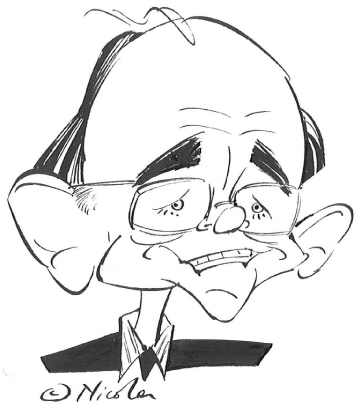
Preface
Every so often I am approached by a young person seeking advice about how to embark on a political career. My advice has always been the same: Go away and do something else first and then you will be more use if and when you are elected to Parliament. On reflection this may be wrong. The careers of many of todays brightest and most successful politicians have followed an entirely different trajectory: university (usually Oxford), a job in the office of an MP or as a policy wonk in a think tank, leading perhaps to work in the private office of a minister or a member of the Shadow Cabinet, before being shoehorned into a safe seat (often with the help of powerful allies acquired en route). This trend was especially apparent during the New Labour era.
Rightly or wrongly, Tony Blair had a low opinion of the parliamentary Labour party and was determined to lever into Parliament bright young people in his own image and likeness with a view to making them ministers at the earliest opportunity. As a result, a sort of first- and second-class carriage developed in the House of Commons tea room. Once elected, the former special advisers were a race apart from those of us who had laboured in the salt mines of Opposition for decades. To be sure, they were usually highly intelligent and personable, but many of them had never knocked on a door on behalf of anyone but themselves at election time. Most had never asked a question even mildly sceptical of the official point of view. Nor had they done much else in life, apart from politics. They did not linger long on the back benches. Usually they were wafted into government within months of election and the brightest of them were soon in the Cabinet. By their early forties some had burned out and moved on. This cult of youth was not confined to the Labour Party. Remarkably, by the 2010 general election all three main party leaders had been elected to that post within five years of entering Parliament.
I must not exaggerate. Not all Blairs protgs were young. And not all of them lacked hinterland. Alan Johnson, a most capable politician who would have made an excellent Labour leader, had hinterland in spades. Likewise, no one could argue that Charlie Falconer was not up to the job. Nor is the cult of youth an entirely new phenomenon Harold Wilson was in the Cabinet by the age of thirty-one. There is, however, such a thing as political nous, which cannot be learned from textbooks or policy papers and tends to be acquired gradually as a result of experience. One cant, for example, help wondering whether, had he spent more time at ground level, Liam Byrne would have left that notorious note for his successor at the Treasury, to the consternation of both Byrne himself and his party. Anyway, for the time being at least, the astonishing rise of Jeremy Corbyn has (if only temporarily) brought the cult of youth in politics to a shuddering halt.
Perhaps there is no right answer. Maybe what is required for a healthy democracy is a mix of politicians of all ages and professions, male and female. Our political system requires not only MPs who are capable of governing, but also individuals capable of holding the executive to account for the power they wield. On balance, however, it remains my view that hinterland is a useful attribute for any budding politician, whichever path they follow. For better or worse, I was a politician with hinterland. By the time I was elected, aged thirty-nine, I had lived and campaigned for many years in one of the toughest parts of inner London. I had been active in politics for the best part of twenty years. As a journalist I had travelled widely, reporting from, among other places, the wars in Vietnam, Laos and Cambodia. I had seen the sun rise over the Himalayas and go down over the Gobi desert. I was the author of three novels (one of which is still in print thirty-five years after publication) and I had travelled down some very dark alleyways in search of the perpetrators of the Birmingham bombings. This is the story of my life.
Chris Mullin
Footnote
On leaving office in 2010, Byrne wrote, Dear Chief Secretary, I am afraid there is no money. Kind regards, Liam and good luck. It was meant as a joke, of course, but the Tories exploited it mercilessly.
Acknowledgements
My thanks to the following: Judy Burg, former university archivist at the Hull History Centre, where my papers are stored; also to her successor Simon Wilson and his most helpful colleague, Claire Weather-all; my friend Jean Corston, a colleague on the Home Affairs Select Committee and who later chaired the parliamentary Labour party; my late uncles Brian, Peter and Terence Foley for their account of family history; Alastair Logan, for running his expert eye over my account of the Guildford Four case; Kevin Marquis, my agent during four general elections; Colin Moore and his late wife Jean (ne Martin), for help with my recollections of my much loved childhood neighbours Georgina and Charlie Martin; Leslie and Teresa Mullin, my late parents, for an account of their lives; Carol Roberton, Neil Sinclair and Doug Smith, for their help with background on Sunderland; Marina Warner, for her recollection of the John Anstey regime at the Telegraph magazine; my good friend the distinguished journalist Martin Woollacott, for looking over my account of our two weeks in Cambodia in that fraught summer of 1973; Sheila Williams and Ruth Winstone, for reviewing the manuscript and making many helpful suggestions; Andrew Franklin and his team at Profile Books, in particular my editor Cecily Gayford, for much useful help and advice; my agent Caroline Dawnay and her assistant Sophie Scard for their efforts on my behalf. Last but not least, my wife, Ngoc, for her account of growing up in war-torn Vietnam and for the life we have shared together.
CHAPTER ONE
Poor Sunderland
What has gone wrong in Sunderland? asked Neil Kinnock reacting to the news of my selection as a candidate for the Labour stronghold of Sunderland South. The leader of my party was on a visit to the north-east of England. Finding himself in the Dragonara Hotel in Middlesbrough, and believing himself to be in safe company, he began to make his mouth go, as he was occasionally inclined to do.
Next page
